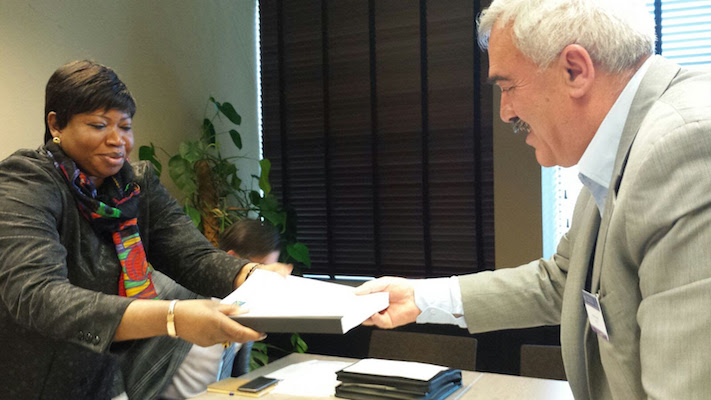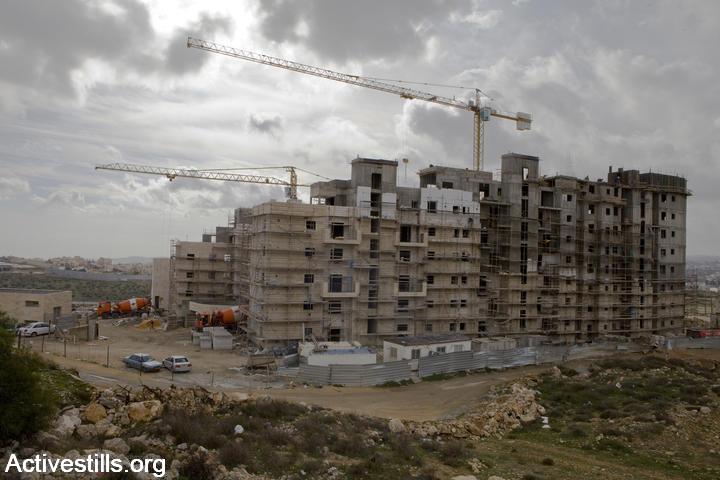The International Criminal Court prosecutor is conducting a ‘preliminary examination’ into the 2014 Gaza war. But are Israeli officials at higher risk of prosecution for illegally building settlements in the West Bank?

Four Palestinian human rights organizations submitted research, testimonies and documentation to International Criminal Court prosecutor Fatou Bensouda on Monday, which they said contain evidence of war crimes and crimes against humanity committed by Israelis during the 2014 Gaza war.
The four Palestinian human rights organizations, Al-Haq, Al-Mezan, Aldameer and the Palestinian Center for Human Rights (PCHR), said the information they handed over to Bensouda on Monday detailed “illustrative instances” of murder, torture, intentional attacks on civilians and and civilian targets, and extensive destruction that had no military necessity.
“We have provided the Office of the Prosecutor with enough information for it to determine that there is a reasonable basis to believe that senior Israeli military and civilian officials committed crimes against humanity and war crimes during the offensive against Gaza,” Al-Haq director Shawan Jabarin said after hand-delivering the materials to Bensouda in The Hague on Monday.
In accordance with the process laid out in the Rome Statute, the treaty that established the International Criminal Court, Bensouda opened a preliminary investigation into the situation in Palestine on January 16, 2015, 15 days after Palestine joined the court.
Following the preliminary examination, the ICC prosecutor will decide whether or not to open a full-fledged investigation, which can result in criminal indictments of individuals suspected of committing war crimes and crimes against humanity.
In the current phase, the ICC prosecutor is gathering information from publicly available sources, as well as from individuals or groups, states, international organizations and from NGOs like human rights organizations. She then “take[s] steps to analyze and verify the seriousness of information received, including through a rigorous and independent source evaluation process.”
In a progress report published prior to the submission from the Palestinian rights organizations, Bensouda’s office said that it had thus far received 66 such communications containing information about alleged crimes committed since the start of the 2014 Gaza war, submitted by both individuals and other organizations.
‘Israel is unwilling to hold its soldiers accountable, Palestine is unable’

One criterion the prosecutor must take into account, the principle of complementarity, will be particularly important when deciding whether to open a full-fledged investigation into alleged war crimes committed by Israel.
Complementarity means that if Israel investigates its own soldiers for suspected war crimes, and if it does so in good faith, then the ICC has no jurisdiction. But if the ICC determines that Israel is unwilling or incapable of investigating itself, then it may indeed have jurisdiction over war crimes committed by Israeli citizens, ranging from individual soldiers to generals and politicians.
Israel has not codified war crimes into its penal code, with the exception of genocide and crimes related to the Holocaust. Thus far, the only indictments that have been served against Israeli soldiers for crimes committed during the 2014 Gaza war are related to small-scale looting.
Based on experience seeking justice for Palestinian victims through Israeli courts, the Palestinian human rights organizations said they do not believe complementarity will pose a significant hurdle to an ICC investigation in this case. “Israel is unwilling and Palestine is unable to domestically hold to account Israeli perpetrators of international crimes,” PCHR director Raji Sourani said.
In addition to Israeli crimes in Gaza during the 2014 war, however, the ICC preliminary examination is also focusing on alleged Palestinian crimes, particularly the indiscriminate firing of rockets toward Israeli civilians, using civilian buildings and areas for military purposes, and the summary execution of 20 Palestinians accused of collaborating with Israel.
Settlements as a war crime

Another area that few people are discussing publicly is the possibility that the ICC will open an investigation into Israeli settlement activities in the West Bank. Under the Rome Statue, an occupying power is prohibited from transferring, directly or indirectly, parts of its own population into the occupied territory.
An estimated 500,000 Israelis live in settlements beyond the Green Line, including in East Jerusalem.
The ICC prosecutor is currently examining the “carefully conceived network of policies, laws, and physical measures” that support the creation and expansion of Israeli settlements in the West Bank, according to an ICC report on the prosecutor’s activities. The prosecutor is also examining an alleged “scheme of subsidies and incentives to encourage migration to the settlements and to boost their economic development.”
Israeli officials may ultimately be far more exposed to the risk of ICC prosecution for settlement activities than suspected war crimes in Gaza. Whereas Israel can attempt a complementarity defense with regards to war crimes in Gaza by pointing to domestic investigations of its soldiers, Israel’s High Court of Justice has never even agreed to hear a single argument on the legality of settlements.
“Israel’s main problem is indeed with settlements since this is a topic that has no complementarity issue at all,” human rights lawyer Michael Sfard explained to +972. “All the evidence and policies are known and accessible.” The magnitude of the crime and the number of people and communities who have been affected by it over nearly 50 years, Sfard added, “makes it the perfect case for a world criminal court.”
Indeed, the issue of gravity and the ICC’s willingness to investigate alleged Israeli crimes has been a hot topic in the ICC in recent weeks. Earlier this month an ICC appeals court essentially rejected a decision by Bensouda not to investigate Israel’s killing of 10 Turkish nationals aboard the Mavi Marmara in 2010. Bensouda had decided not to investigate based on her assessment that the alleged crime was not of “sufficient gravity” to warrant intervention by the ICC.


